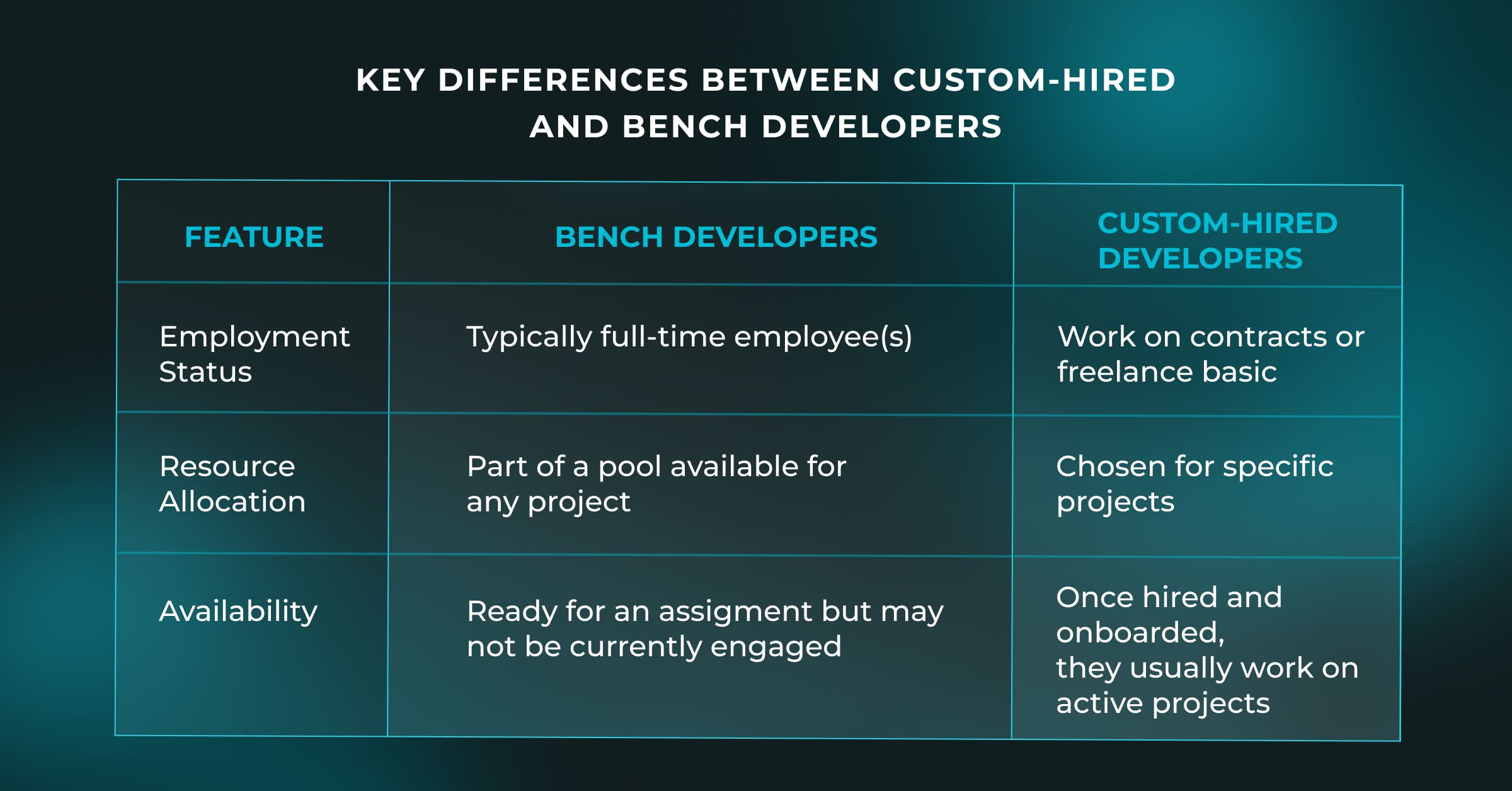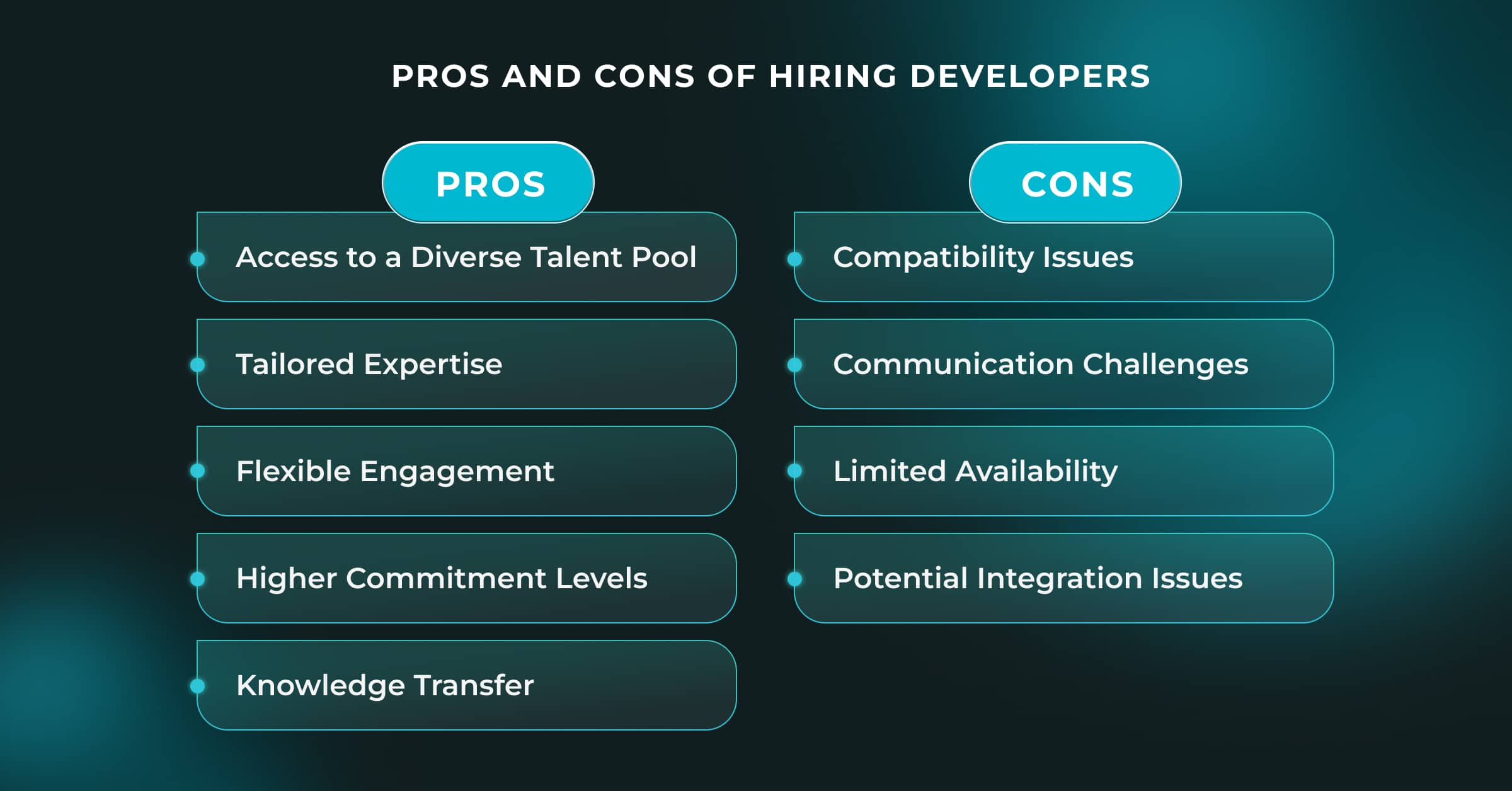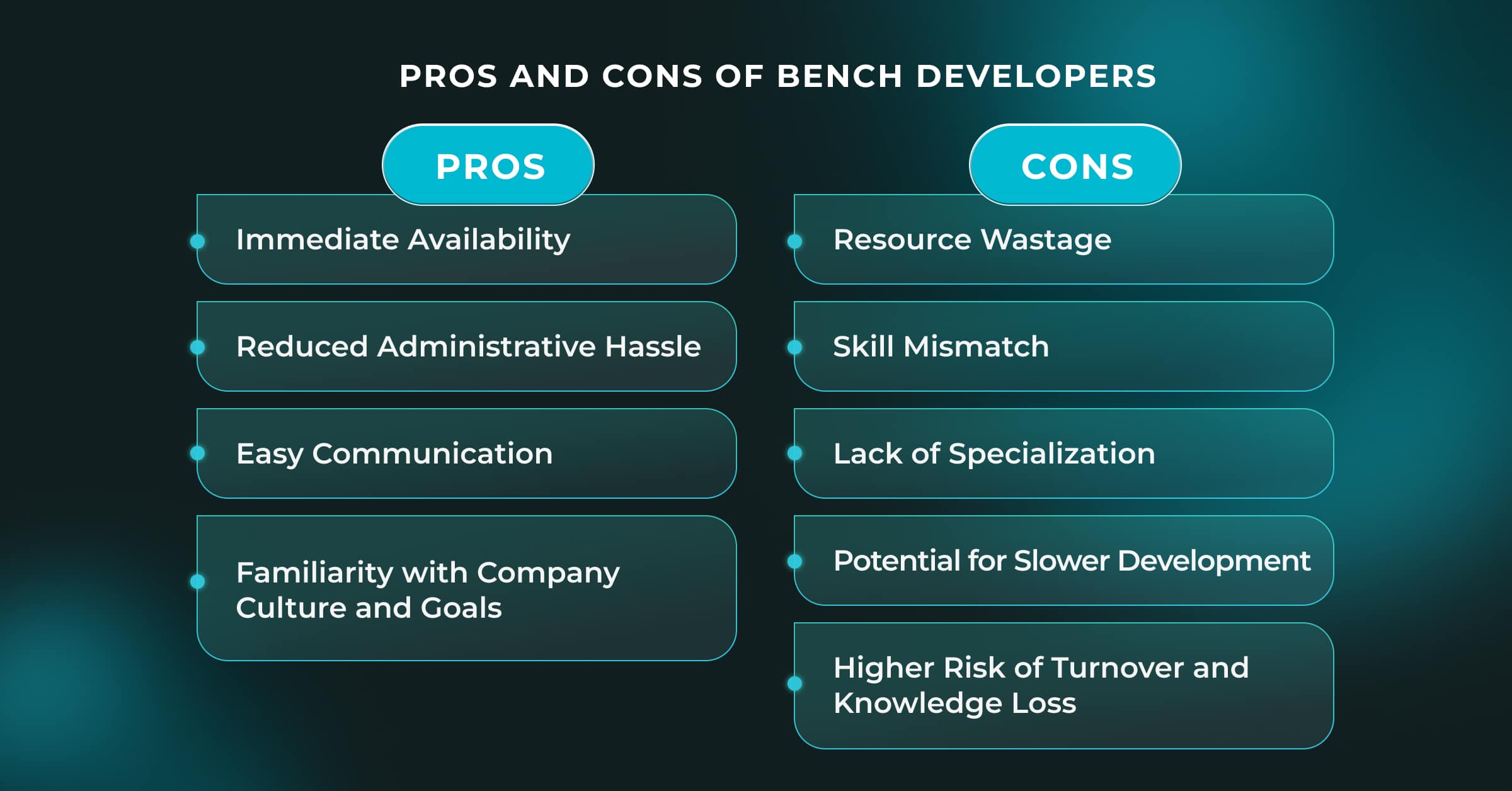Custom Software Developers Vs. Bench Developers
The demand for skilled developers has been rising sharply. In the USA, for example, this demand is set to rise by 25% by 2032, showing just how much technology is growing in every industry around the world.

However, when it comes to hiring, businesses are facing a big question — should they hire custom developers who can tailor their skills to specific projects, or rely on bench developers available on demand?
To make a smart decision, it’s essential to first grasp what is meant by bench in IT company. Then, see how this concept compares to hiring custom software developers. Let’s dive into the details to help you understand better.
Understanding Custom-Hired Developers
Custom-hired developers work on specific projects designed just for a client’s needs. They build digital products, websites, apps, or software, one project at a time or based on what the client wants. This personalized approach ensures that each solution is perfectly aligned with the client’s unique requirements. Businesses usually find custom-hired developers through different channels. These include:
- Freelance Platforms. Businesses may find freelance developers using websites such as Upwork, Freelancer, and Fiverr. Clients can select developers that fit their needs by looking through portfolios and candidate profiles.
- Developer Communities. Engaging with communities like GitHub or StackOverflow helps connect with skilled developers with expertise in particular technologies or domains.
- Specialized Vendors. These agencies vet and recruit developers based on skills and qualifications. They offer dedicated development teams, project management support, and other professional services.
- Internal Referrals. Existing employees or developer connections can recommend suitable candidates from their network.
Understanding Bench Developers
Bench developers, also known as on-bench developers or bench resources, are developers pre-hired by organizations as part of their talent strategy. These professionals go through the usual hiring process like interviews and skill tests. However, they aren’t immediately assigned to projects. Instead, they stay on standby, ready to be deployed when needed.
Many IT firms run a bench management system, where they keep a portion of their staff on standby, ready for project deployment. For instance, Infosys and Wipro recently revealed that they have 22.9% and 27.7% bench staff, respectively.
Key Differences Between Custom-Hired and Bench Developers

Pros and Cons of Custom-Hired Developers
Now that we understand the concept of bench in company operations versus custom-hired developers and how these two models function, let’s delve into their pros and cons, beginning with custom-hired developers.

Pros
- Access to a Diverse Talent Pool. One of the most significant pros of hiring custom developers is the exposure it provides to an extensive and diverse talent pool from around the world. This offers a rich array of skills, and experiences that can greatly enhance creativity.
- Tailored Expertise. Hiring developers means that you can select experts with skills that precisely fit your project – from proficiency in a certain programming language to familiarity with specific tech tools, or experience in a particular sector.
- Flexible Engagement. Custom developers can easily adapt to changing project requirements. Whether you need to scale the team, change roles, or work with a dedicated team, custom-hired developers provide the agility necessary to adapt to evolving needs without the limitations of traditional hiring.
- Higher Commitment Levels. Custom developers typically exhibit higher levels of commitment and dedication to project success. Their primary focus is on delivering completed project executions within the allocated time and budget. This heightened level of commitment can lead to tangible benefits for all parties involved, including increased productivity and efficiency, ultimately contributing to project success.
- Knowledge Transfer. Hiring custom developers can result in lasting partnerships and knowledge preservation. When you discover a developer who surpasses your expectations, you can establish a long-term relationship. This guarantees continuity for upcoming projects and maintains valuable project knowledge. As the developer becomes more acquainted with your project, they can offer valuable insights and suggestions for enhancement.
Cons
These are some of the possible challenges you may encounter working with custom teams.
- Compatibility Issues. When you decide to bring in custom developers, there’s a possibility that they might not mesh well with your current team dynamics. Differences in work styles, communication preferences, or clashes in personality could create friction. This can affect communication, teamwork, and productivity.
- Communication Challenges. Communication can be a challenge when collaborating with custom-hired developers. This typically happens when they are remote or from diverse cultural backgrounds. Language barriers, time zone disparities, and differing communication norms can trigger misunderstandings, setbacks, and inefficiencies in advancing project milestones.
- Limited Availability. Finding skilled custom-hired developers can be tough due to fluctuating market conditions. Sometimes, there’s high demand, sometimes there’s a shortage. This makes it hard to get the best talent when you need it. Plus, competition for experienced developers can drag out the hiring process, and force you to settle for less skilled candidates.
- Potential Integration Issues. Integration issues may arise as custom-hired developers may not be familiar with the client’s internal systems, processes, and protocols. This can prolong the onboarding phase unnecessarily. Neglecting these integration challenges could result in inefficiencies, compatibility hurdles, and delays in project completion.
Pros and Cons of Bench Developers
Operating a bench in IT company operations also has its share of pros and cons. Let’s look at a few here.

Pros
Here are some of the benefits of keeping a software developer team on standby.
- Immediate Availability. On-bench developers are team members ready to jump into projects right away. This is super handy when there’s a sudden project surge or urgent need for a replacement due to unexpected events like illness or resignation. Instead of going through the whole hiring process, you can tap into these developers to fill the gap fast and keep projects rolling smoothly.
- Reduced Administrative Hassle. Hiring new staff means lots of paperwork – job posts, resume reviews, interviews, and onboarding forms. But with on-bench developers, they’re already on the company payroll and know the ropes, so there’s less admin work when assigning them to the new project(s). This frees up time and resources for HR and managers to focus on other important tasks.
- Easy Communication. As they are typically in the office or reachable via email, chat, or calls, the on-bench approach facilitates easy and seamless communication for project managers and team leads. Thanks to this ease of communication, projects can move forward without hiccups, and any issues can be sorted out quickly.
- Familiarity with Company Culture and Goals. On-bench developers have been in the company structure and get its culture, values, and goals. This familiarity makes it easier to integrate them into project teams since they’re already in tune with the company’s mission and how things operate. Plus, they’re more likely to sync their work with company goals, boosting productivity and team spirit.
Cons
Here are some cons of using a bench policy.
- Resource Wastage. Keeping developers on the bench, not actively working on projects, can waste money without boosting productivity. While having some on-bench developers is necessary for flexibility, having too many idle resources strains the budget and hurts efficiency. Finding the right balance is key.
- Skill Mismatch. Sometimes, on-bench developers might lack specific skills needed for upcoming projects. They might have general programming knowledge but need extra training for certain technologies or frameworks. This can slow down projects and lead to delays or rework.
- Lack of Specialization. In contrast to skill mismatch, the lack of specialization refers to a broader deficiency in expertise within niche areas or emerging technologies. On-bench developers may have a wide range of skills but lack deep expertise in niche areas like blockchain, AI, or IoT. This limits your company’s ability to take on specialized projects or seize emerging opportunities. Lack of specialization can affect competitiveness and growth potential.
- Potential for Slower Development. If on-bench developers aren’t assigned to projects quickly, development cycles may slow down. It takes time to match developers with suitable projects, especially in large organizations. Delays in starting projects can impact time-to-market and customer satisfaction.
- Higher Risk of Turnover and Knowledge Loss. Underutilized on-bench developers may lose job satisfaction and leave, taking valuable knowledge with them. This disrupts projects and team performance, affecting morale and productivity.
Why Custom-Hired Specialists are More Beneficial
In today’s tech industry, hiring remote developers is a top-notch strategy for meeting the skill needs of any software development project, easily outshining any bench team on standby.
These professionals boast an impressive 90% retention rate, compared to the 60% of in-house employees. Moreover, they bring fresh perspectives and innovative ideas to the table, enhancing problem-solving and innovation in the development process.
Let’s not forget that hiring custom developers is also good for your bottom line. You only pay for the services you need for the project’s duration, leading to better budget management and resource allocation. Plus, these developers often bring diverse experiences from various projects and industries, seamlessly adapting to various challenges and requirements.
On the flip side, maintaining developers on standby without active projects can mean incurring higher overhead costs, including salaries, benefits, and training expenses, without actively contributing to your projects. If you want tailored solutions, optimized resource use, innovation, and guaranteed project success, then working with specialized teams is the secret.
Conclusion
When hiring custom software developers, it’s important to remember that the success of this approach lies in working with a reliable partner who can help you build the right team for your project. This is where Newxel excels. As a global IT staffing company, Newxel IT can help you headhunt top-tier developers, ensuring a seamless integration of talent into your software projects.
Our IT talent acquisition and recruitment expertise has empowered numerous clients to overcome their technical challenges and achieve remarkable results. We’ve helped organizations across diverse industries find the perfect developers to drive their projects forward. We can do the same for you.
Elevate your software development endeavors with the right talent from Newxel. Reach out to us today and embark on a journey toward unparalleled success in your projects.







